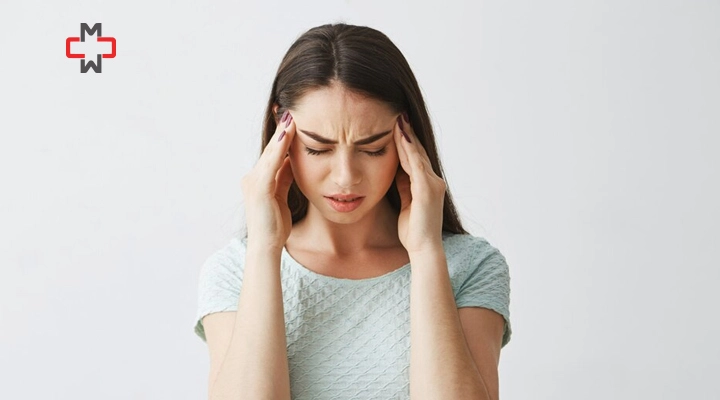High cholesterol is a common health concern in the United States, affecting nearly 2 in 5 adults, according to the CDC. But can high cholesterol cause headaches? While there is no direct link between high cholesterol and headaches, the vascular effects of high cholesterol may contribute indirectly to symptoms like frequent headaches, dizziness, or reduced blood flow to the brain.
What Is High Cholesterol?
High cholesterol refers to an excessive amount of cholesterol in the bloodstream. Cholesterol is a waxy substance necessary for building cells and producing hormones. The body makes all the cholesterol it needs, but certain foods, a sedentary lifestyle, and a family history of high cholesterol can cause excess cholesterol to circulate in the blood.
Cholesterol travels through the blood in particles called lipoproteins, including:
- Low-density lipoprotein (LDL): Known as “bad cholesterol,” it can deposit fatty buildup (fatty deposits) in blood vessels, narrowing them and increasing the risk of heart disease.
- High-density lipoprotein (HDL): Called “good cholesterol,” it helps remove LDL from the bloodstream, promoting better cardiovascular health.
How High Cholesterol Affects the Body
When LDL cholesterol levels are high, fatty plaques build up in arteries, which can:
- Restrict blood flow to the brain
- Block blood flow in key areas, increasing stroke and heart attack risk
- Cause blood clots to form, especially in narrowed arteries
These effects not only threaten your heart but can also interfere with oxygen reaching the brain, potentially triggering headaches in some patients.
Can High Cholesterol Cause Headaches?
There is no solid scientific proof that high cholesterol directly causes headaches. However, clinical experience from our team at Manhattan Medical Arts, led by Dr. Syra Hanif, shows that patients with high cholesterol levels sometimes report severe headaches or frequent headaches, particularly when also experiencing high blood pressure, vascular narrowing, or disease control issues.
In these cases, the reduced blood flow from cholesterol buildup in blood vessels may play a role in trigger headaches—especially among those with additional medical conditions like hypertension.
✅ Schedule a walk-in, virtual, or online visit with a primary care doctor today.
Symptoms That May Overlap With High Cholesterol
Although high cholesterol levels often present with no symptoms, people may experience:
- Dizziness or lightheadedness from reduced blood flow
- Neck pain and tension
- Shortness of breath (linked to cardiovascular disease)
- Fatigue or confusion during activity
- Yellow bumps near the eyes (xanthelasma)
These may not confirm a cholesterol issue, but they can be indirect clues.
Testing: How to Know If High Cholesterol Is a Problem
The only way to diagnose high cholesterol is with a blood test, typically a lipid panel. This measures:
- Total cholesterol
- LDL cholesterol
- HDL cholesterol levels
- Triglycerides
According to the American Heart Association, adults should have regular cholesterol screenings every 4–6 years, starting at age 20.
Risk Factors for High Cholesterol
You may be more likely to develop high cholesterol if you:
- Have a family history of heart conditions
- Consume saturated fats or trans fats frequently
- Live a sedentary lifestyle
- Are overweight (high body mass index)
- Smoke or have excessive alcohol consumption
- Experience hormonal changes (e.g., post-menopause)
High cholesterol increases the increased risk of coronary artery disease, stroke, and other health problems—many of which can cause severe headaches on their own.
✅ Book an appointment now to check your cholesterol levels and headache symptoms.
Managing Headaches When You Have High Cholesterol
Whether high cholesterol is contributing to your headaches or not, the solution often overlaps:
Lifestyle Changes:
- Follow a healthy diet low in saturated fats and trans fats
- Adopt a heart healthy diet rich in fruits, veggies, and whole grains
- Exercise regularly to improve cardiovascular health
- Lose weight or maintain a healthy weight
- Limit alcohol consumption
- Stop smoking (quitting smoking improves HDL fast)
- Practice stress management
- Improve sleep hygiene and track headache triggers
Medications:
- Statins: Lower ldl cholesterol and reduce long-term heart risk
- Other options: PCSK9 inhibitors, bile acid sequestrants, cholesterol absorption inhibitors
- Over-the-counter headache meds (short term only)
✅ Need help managing both cholesterol and headaches? Schedule a virtual consultation.
FAQs
Can high cholesterol cause headaches and dizziness?
While cholesterol doesn’t directly cause these symptoms, restricted blood flow due to clogged arteries may lead to dizziness and potentially trigger headaches.
What are the signs in your face of high cholesterol?
Look for xanthelasma (yellow deposits near eyelids) or a gray ring around the cornea (arcus senilis).
How do you feel when your bad cholesterol is high?
Often, there are no symptoms. In some cases, people feel fatigue, shortness of breath, or tightness in the chest—signs of progressing cardiovascular risk.
How to get rid of cholesterol headaches?
Focus on lowering cholesterol levels, managing blood pressure, tracking triggers, and adopting a healthy lifestyle. Consult your doctor before starting medications.
Final Word
While there’s no proven direct link that high cholesterol causes headaches, the indirect effects—from blood flow changes to coexisting medical conditions—can’t be ignored. If you’re dealing with frequent headaches and suspect a cholesterol issue, get evaluated.
At Manhattan Medical Arts, we combine internal medicine, clinical trials, and primary care expertise to address both conditions together.
✅ Take control of your cardiovascular health and headache symptoms today. Book your appointment here.
Disclaimer
This blog is for informational & educational purposes only, and does not intend to substitute any professional medical advice or consultation. For any health related concerns, please consult with your physician, or call 911.
-
About The Author
Dr. Syra Hanif M.D.Board Certified Primary Care Physician
Dr. Syra Hanif is a board-certified Primary Care Physician (PCP) dedicated to providing compassionate, patient-centered healthcare.
Read More







